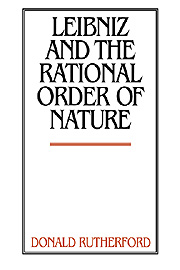Book contents
- Frontmatter
- Contents
- Acknowledgments
- A Note on Citations and Translations
- Abbreviations
- Introduction
- Part I Theodicy
- 1 The Vindication of Divine Justice
- 2 The Maximization of Perfection and Harmony
- 3 Happiness and Virtue in the Best of All Possible Worlds
- Part II First Philosophy
- Part III Nature
- Conclusion
- Bibliography
- Index
2 - The Maximization of Perfection and Harmony
Published online by Cambridge University Press: 05 June 2012
- Frontmatter
- Contents
- Acknowledgments
- A Note on Citations and Translations
- Abbreviations
- Introduction
- Part I Theodicy
- 1 The Vindication of Divine Justice
- 2 The Maximization of Perfection and Harmony
- 3 Happiness and Virtue in the Best of All Possible Worlds
- Part II First Philosophy
- Part III Nature
- Conclusion
- Bibliography
- Index
Summary
Leibniz describes the best of all possible worlds as the world of greatest perfection and greatest harmony. We saw in the preceding chapter that these designations are closely associated with a notion of the world's “most fitting” construction. As such, they point to features of the best of all possible worlds that can be characterized independently of any reference to the happiness and virtue of rational creatures. The maximization of perfection and harmony are thus marks of this world's metaphysical superiority over other possible worlds, as opposed to its moral superiority. This chapter examines the nature of this metaphysical superiority and the relationship for Leibniz between the concepts of perfection and harmony.
Optimization versus Maximization
According to Nicholas Rescher, when Leibniz speaks of this as the possible world of greatest perfection, we should understand him as claiming that it optimizes the combination of two crucial metaphysical values: richness or variety of phenomena, and simplicity of laws. In Rescher's view, neither factor is sufficient by itself. Stressing one at the expense of the other would lead to a world that contained less overall perfection. A world composed of a single element, for example, would have much simpler laws than our own, but its lack of variety would lower its degree of perfection. Similarly, a world might be much richer in phenomena than our own is, yet the increased complexity of the laws required to give order to its phenomena would again decrease its total perfection.
- Type
- Chapter
- Information
- Leibniz and the Rational Order of Nature , pp. 22 - 45Publisher: Cambridge University PressPrint publication year: 1995



